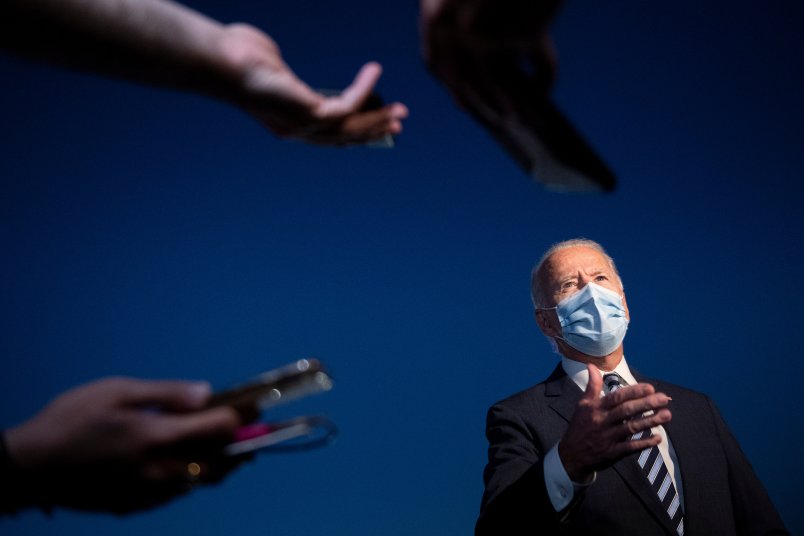Vice President Joe Biden offered up a timeline for how he would respond the COVID-19 pandemic if elected, providing milestones for his proposals to offer a national agenda aimed at halting the virus.
The remarks — made in Wilmington, Delaware on Friday — come as the country grapples with a devastating third wave of the virus. States from Wisconsin to Utah to Texas are seeing record numbers of cases with hospitals overflowing with COVID-19 patients, a repeat of a sequence that has become predictable and familiar since outbreaks of the virus first began in the U.S. in March.
Biden said that, if elected, he would set a task for the transition: speak with every state governor along with local officials to learn what each state needs from the federal government, and in what form.
“I’ll reach out to every governor in every state, red and blue, as well as mayors and local officials, during the transition, to find out what support they need and how much of it they need,” Biden said.
Next, the Democratic candidate added, he would ask “the new Congress to put a bill on my desk by the end of January with all the resources necessary.”
That way, Biden added, “both our public health response and our economic response can be seen through to the end.”
The House of Representatives has passed a bill called the HEROES Act, which would provide economic stimulus, fiscal support, and an expansion of public health funding for the states. That bill also includes billions of dollars in appropriations that would fund the distribution of a COVID-19 vaccine to all Americans.
It’s not clear how that bill might change in response to the needs of local officials, in part because the course of the virus has yet to be determined.
Biden also reiterated themes and points laid out in his COVID-19 plan, first formulated earlier in the year. The former vice president emphasized five points in that plan which he sees as essential to stopping the spread of the virus, and which all map onto various failures of the Trump administration in responding to the pandemic.
He said that he would “mandate mask-wearing at all federal buildings and at all interstate transportation,” and would try to persuade governors and local officials to issue mask-wearing mandates in their areas.
A Biden administration would also aim to increase the number of COVID-19 tests performed in the U.S. each day sevenfold, up from the current average of around 1 million. The Biden plan has also set a goal of hiring at least 100,000 contact tracers to track the spread of the virus in communities around the country.
The third point has to do with personal protective equipment procurement; Biden said he would invoke the Defense Production Act to order PPE production and bring shortages to an end, and would appoint a supply czar to coordinate between states and local governments.
A Biden administration would also issue standardized, apolitical guidelines on reopening the country, leaving decisions on how and when to reopen after viral outbreaks to the discretion of public health officials and experts in epidemiology.
Finally, Biden emphasized, his administration would commit to making a COVID-19 vaccine free, and that any vaccine would be approved on a science-driven, and not political, timeline. In the meantime, his White House would work to coordinate deliveries of drugs that have been shown to help people fight the virus.
Biden added that “we don’t have to be held prisoner by this administration’s failure.”
Should Biden win next week, it’s not clear what effect his victory will have on the path of the virus during the transition period. With cases increasing around the country and the federal response already in disarray, many observers predict rising death rates and overwhelmed hospitals as the virus spreads unabated.
“This is a dark winter ahead,” Biden said.



